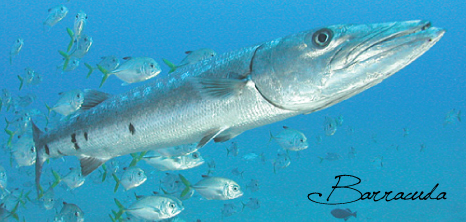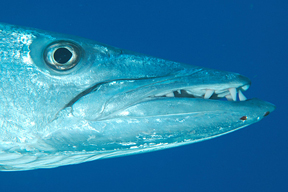|
BarracudasBarracudas (Sphyraenidae barracuda) are a predatory, ray-finned, salt water fish of the genus Sphyraena. They are the only genus in the family Sphyraenidae and can be found primarily in tropical and subtropical oceans worldwide but some species such as the Great Barracuda resides in brackish water.
These scavenger fish are much like the shark in behaviourial patterns and may easily mistake snorkellers for possible prey.
CharacteristicsBarracudas are fish with elongated bodies covered with smooth scales, large pointed heads and in most species, an underbite. These terrifying looking fish have sharp, protuberant teeth that are all of different sizes and firmly set in the sockets of their large jaws. Their fins may be yellowish or a shadowy colour.
When these fish are young, they are inclined to travel in schools but as they mature, they tend to travel alone.
Coloration can vary from species to species but generally barracudas are dark green, dark blue, or gray on their upper bodies with silvery sides and chalky-white bellies. Inconsistently placed black spots can be found on either side in some species as well.
In Barbados, Barracudas are quite popular both as game fish and food. It is quite safe to eat fish that are caught just off Barbados but elsewhere, larger species like the Great Barracuda have been a great source of concern with regards to cases of ciguatera poisoning.
Ciguatera PoisoningReported as the most common form of sea food poisoning in the world, Ciguatera Poisoning is a foodborne illness that is caused by the consumption of certain tropical and subtropical large reef fish, whose flesh have become contaminated with toxins originally produced by dinoflagellates (toxin producing algae) such as Gambierdiscus toxicus. These dinoflagellates cling to coral, algae and seaweed. Ciguatera poisoning tends to increase rapidly amongst predator fish like barracudas as they eat other fish that consume these toxin producing algae.
Through this process, toxins easily move up the foodchain and hence make their way to mankind.
Unfortunately, Ciguatoxin is very heat-resistant thereby making it virtually impossible for fish that is contaminated to be detoxified via traditional cooking methods.
|




